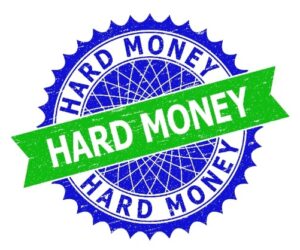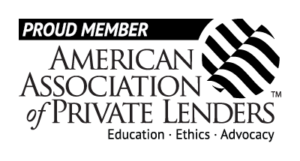Requirements For a Hard Money Loan
The requirements for a hard money loan are much more flexible than for traditional loans. This can be good news for home owners looking to expand their portfolio, start a business or rehab an existing rental property.
Traditional loans don’t offer the same refinancing abilities because they must follow strict government guidelines. You can’t get the funds if you don’t meet those requirements – it’s that simple.
However, this doesn’t mean you must resort to personal loans, credit cards, or giving up your business dreams. Instead, hard money loans can help real estate investors build a powerful real estate business with more flexible hard money loan requirements offering more opportunities to reach your financial goals.

What is a Hard Money Loan?
A hard money loan is a short-term, asset-backed loan. Private money lenders provide hard money loans. We don’t focus on a borrower’s financial background, credit score, or income. Instead, our hard money loan requirements focus on the collateral.
Hard money lender requirements are more flexible because each lender sets its requirements. We don’t have government guidelines to follow and can work on a case-by-case basis, deciding if a loan is a good risk.
The main focus is what the property is worth, its location, and the equity position. With a proper appraisal to prove the property’s value and condition, you could be on your way to expanding your real estate portfolio or refinancing for cash out.
Why Use a Hard Money Loan
Hard money loans are best for borrowers who have unconventional uses for the money. For example, suppose you’re refinancing a home to buy another property or to start a business. In that case, you might have trouble borrowing the funds with a conventional loan, especially if it’s not your primary residence.
Hard money loan qualifications make it much easier to tap into a property’s equity and use it for business purpose. As long as the property is in good condition and you have 30% – 40% equity, you can reach your financial goals.
Most private lenders only offer 1st mortgage trust deeds, however at Independent Lending we also offer a state specific hard money second mortgage.

5 Requirements for a Hard Money Loan
The requirements for a hard money loan are much simpler than conventional loans. The requirements vary by lender and sometimes individual, but on average, here’s what to expect.
1. Purpose Of The Loan
Will the new loan be for a purchase or will it be a refinance? Either way, hard money lenders need to make sure that the new loan is going to be a Business Purpose loan. Business purpose means that the new loan will not cover Consumer Purpose items such as personal debt.
Examples of a business purpose loan are:
2. Property value & Location
Property value is one of the first questions asked by the hard money lender. The homeowners feedback is important in discovering any unique qualities about the property that could affect value. The lender will also do a comprehensive analysis and their own due diligence on market area and like comparables in determining an estimated fair market value or after repair value (ARV).
3. Equity in the property
Because hard money lenders require it, you’ll need adequate equity in the property. On average, lenders want 30% – 40% equity. This means you can borrow 60% – 70% of the property’s appraised value for a refinance and you will need to put down 30% – 40% for a purchase.
Multiply the property value times 60% to be on the safe side, and deduct any outstanding loans you currently have on the property, and that’s how much you may be able to borrow based on current hard money lender requirements.
4. Ability to pay back the loan
While hard money loan qualifications don’t focus on credit or income, you must be able to afford the payments. The proof of income requirements aren’t as stringent as conventional loans. Private money lenders can usually accept most types of income, including verbal stated income. If rental income is being used, then signed lease agreements will be requested by underwriting.
5. Exit Strategy
Hard money loans are usually short term with a balloon payment. These balloon payments are typically in 6 – 60 months meaning that the entire balance becomes due. The hard money exit strategy is especially important for owner occupied hard money loans where the collateral is a primary residence.
A solid exit strategy that will be performed at some stage prior to the mature date needs to be discussed with the loan officer:
Popular Exit Strategies:

Pros and Cons of Hard Money Loan Requirements
Now that you know the requirements for a hard money loan let’s look at the pros and cons to help you fully understand how they work.
Pros of Hard Money Loan Requirements
Cons of Hard Money Loan Requirements
Final Thoughts
Hard money loan requirements are much more flexible than most people realize, especially since each lender has different guidelines.
At Independent Lending, we work with individuals on a case-by-case basis. We don’t have cut-and-dry requirements that you can’t get a loan if you don’t meet the rigid requirements. Instead, we look at the factors of your application and fit you into the loan that will help you reach your goals.
Helping borrowers for many years achieve their real estate dreams, Independent Lending can help you reach your goals too. Contact us and let’s discuss your situation to see how we can make requirements for a hard money loan work for you.




